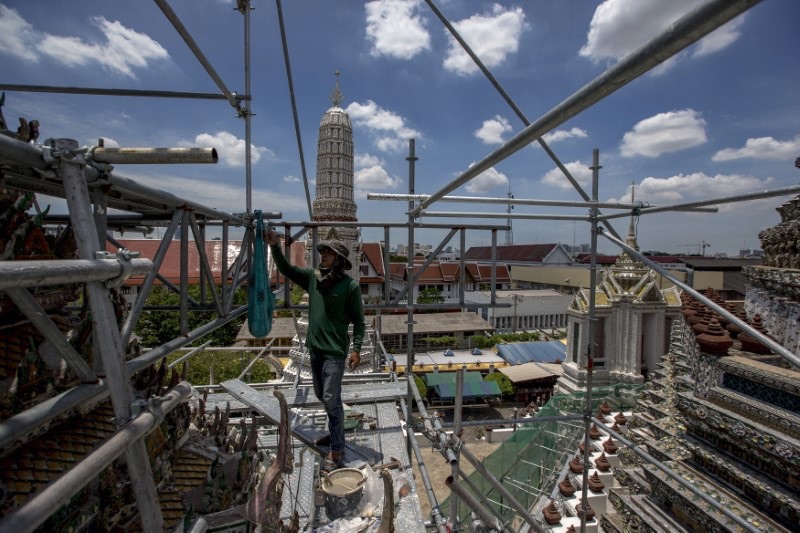Bangkok, Thailand
Thomson Reuters Foundation
A partial lockdown in Thailand to limit the spread of coronavirus exempts construction, exposing thousands of migrant workers to the deadly disease, human rights groups warned on Monday.
Thailand has more than 700 coronavirus cases, a health ministry spokesman said on Monday, the majority in Bangkok.

A labourer works on a stupa inside a temple in Bangkok, Thailand, on 14th August, 2015. PICTURE: Reuters/Athit Perawongmetha
The South-East Asian nation has shut down malls in Bangkok for 22 days and extended the closure of schools, bars and cinemas in the capital to curb the outbreak. Several provinces also implemented similar measures.
But construction work on high-rise apartments and office complexes continues, with hundreds of migrant workers seen heading to work in the morning, only a few wearing face masks or bandanas around their nose and mouth.
“Very little allowance is being made for migrant construction workers – they are not being given masks or hand sanitisers or any information about the coronavirus,” said Brahm Press, director of MAP Foundation, a migrant rights charity.
“They should be allowed to return home if they choose to without any penalty, and come back when it is safe. They live in such cramped quarters and have limited access to healthcare; if the disease reaches them, it would be disastrous,” he said.
A spokeswoman for the Bangkok Metropolitan Administration did not answer calls seeking comment.
Elsewhere in the region, Malaysia has included construction sites in its restrictions, fining one company and asking others to shut down, while Singapore has also allowed building work to continue.
Authorities must not overlook migrants who face difficulties in accessing healthcare and in protecting themselves against the virus, a South-East Asian network of parliamentarians for human rights (APHR) said on Monday.
“It is those who are the most vulnerable who will suffer the most. No one should be left behind during this crisis,” said Eva Sundari, an APHR member.
Thailand has more than three million migrant workers, according to the International Organization for Migration, with rights groups putting the figure higher.
Construction is the top employer of migrant workers, with workers from Cambodia, Myanmar and Laos making up most of the nearly 600,000 documented migrants in the sector, according to the International Labour Organization.
The workers generally live in refashioned containers or shacks of tin and plywood at the sites or nearby, with poor sanitation and limited access to potable water.
Hundreds of migrant workers returned to their homes before border checkpoints in Thailand were shut on Sunday night. But construction workers have remained.
“The reason to keep construction sites open seems to be, if they can continue to work, they should, as they have deadlines,” said Sasiwimon Paweenawat, an assistant professor at the School of Economics at the University of the Thai Chamber of Commerce.
“But workers who have remained are at high risk for the virus. And if they choose to go back to their homes, they risk carrying the infection back,” she told the Thomson Reuters Foundation.





